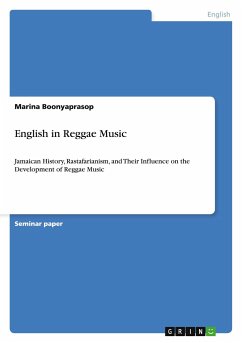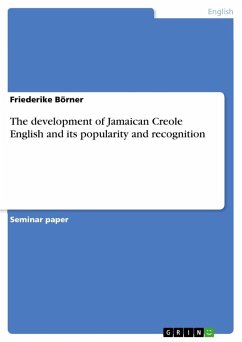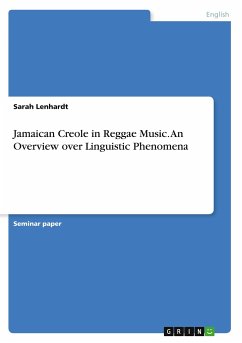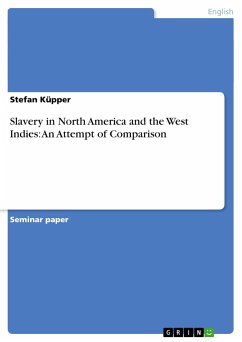Seminar paper from the year 2008 in the subject English Language and Literature Studies - Linguistics, grade: 1,0, University of Marburg, course: Anglistik / Englische Sprachwissenschaft, language: English, abstract: From the 1970s up to today, Reggae has been one of the most popular types of music in many countries all over the world. Having its roots in Jamaica, it was promoted by many artists, such as Bob Marley and Peter Tosh, and carried into many parts of the world. The growing popularity and the influence Reggae had on many other music genres gives a reason for an in-depth analysis of the background and development that created reggae music. In order to analyze music thoroughly, three major components need to be analyzed: historical background, language and music development. One of the earliest and most important influences on Jamaica's current music culture is the period of slavery in the Caribbean. Cruelty, oppression, and hunger for revolt can be seen as foundation for the development of Reggae. In addition to the importance of Jamaican and especially African-Jamaican history this paper deals with the relevance of Rastafarianism. The longing for freedom and equality as well as the discontent with life under white rule paved the way for the emergence of a new belief, which was based on the maxim of Black Pride and the superiority of the black race. It was not only people and their souls which were influenced by the colonialists, but also their language. Through the blend of West-African languages and English, Jamaicans established their own Creole, which can be heard in almost all reggae lyrics. As well as the experiences during the days of slavery, the newly discovered religion along with the pride and self-confidence involved, did not only change the way of life and thinking for many people with African descent, but also altered the language. The third component that led to today's Reggae was the development of Jamaican music throughout the history. Based on the Africa-inspired drumming of slaves and impacted by Rastafarian and North-American music, styles such as Ska, Rocksteady, and finally Reggae were able to evolve. By taking all three components into account, two Reggae songs are analyzed. Especially phonetic differences between the used language and Present Day English (PDE) as well as the similarities to Rastafarian Talk are examined. Overall, this paper gives an insight into the reasons and circumstances that enabled Reggae to emerge. Taking this background into account, lyrics are analyzed in order to prove that history and religion were not only precursors but are still present in today's music.
Hinweis: Dieser Artikel kann nur an eine deutsche Lieferadresse ausgeliefert werden.
Hinweis: Dieser Artikel kann nur an eine deutsche Lieferadresse ausgeliefert werden.








